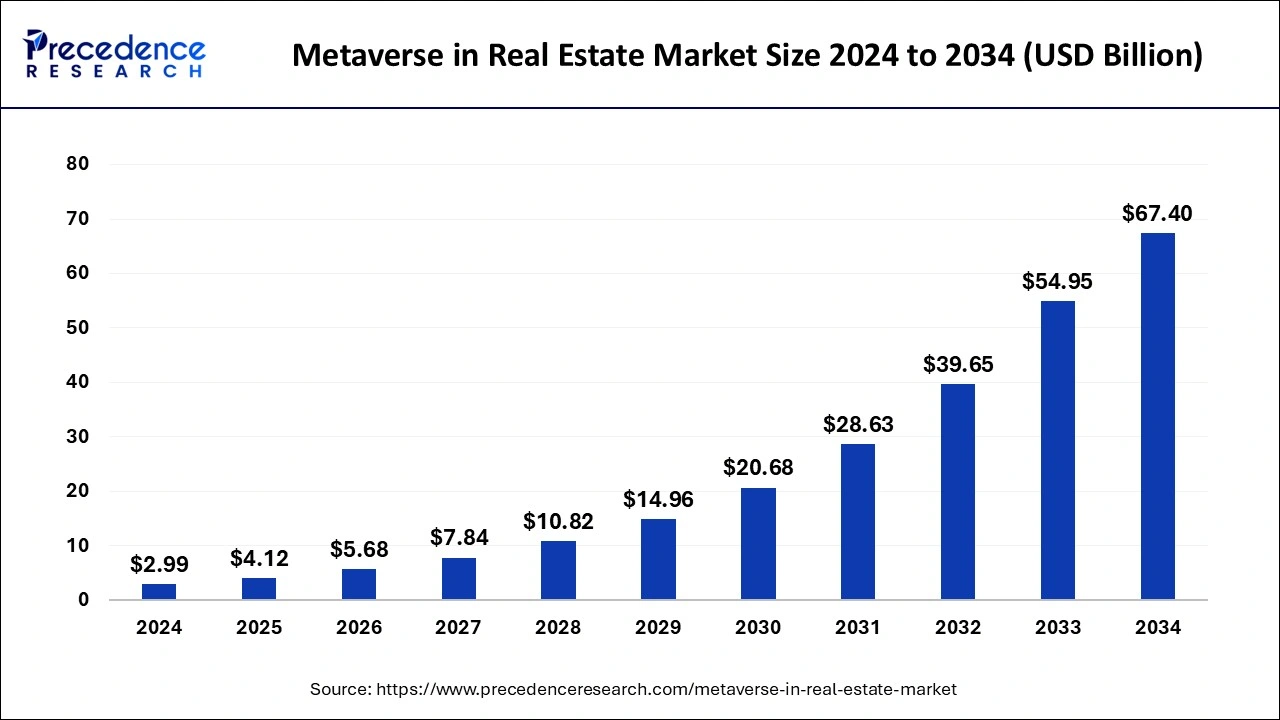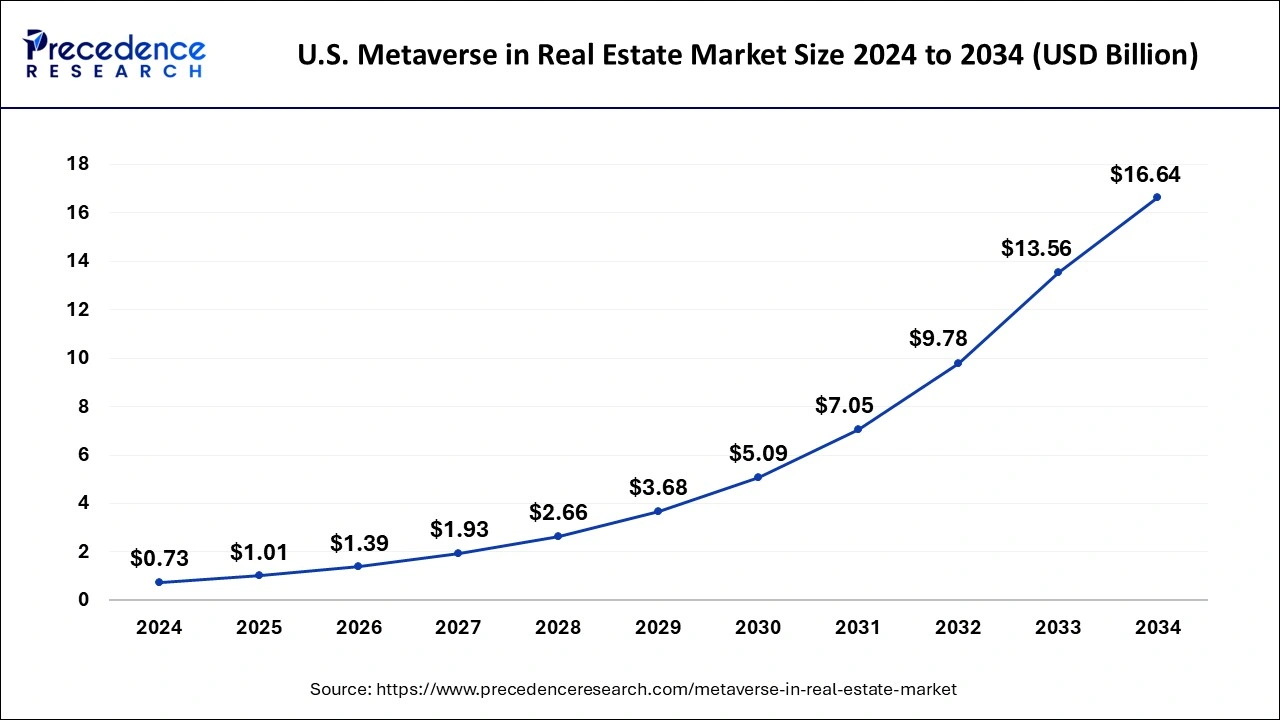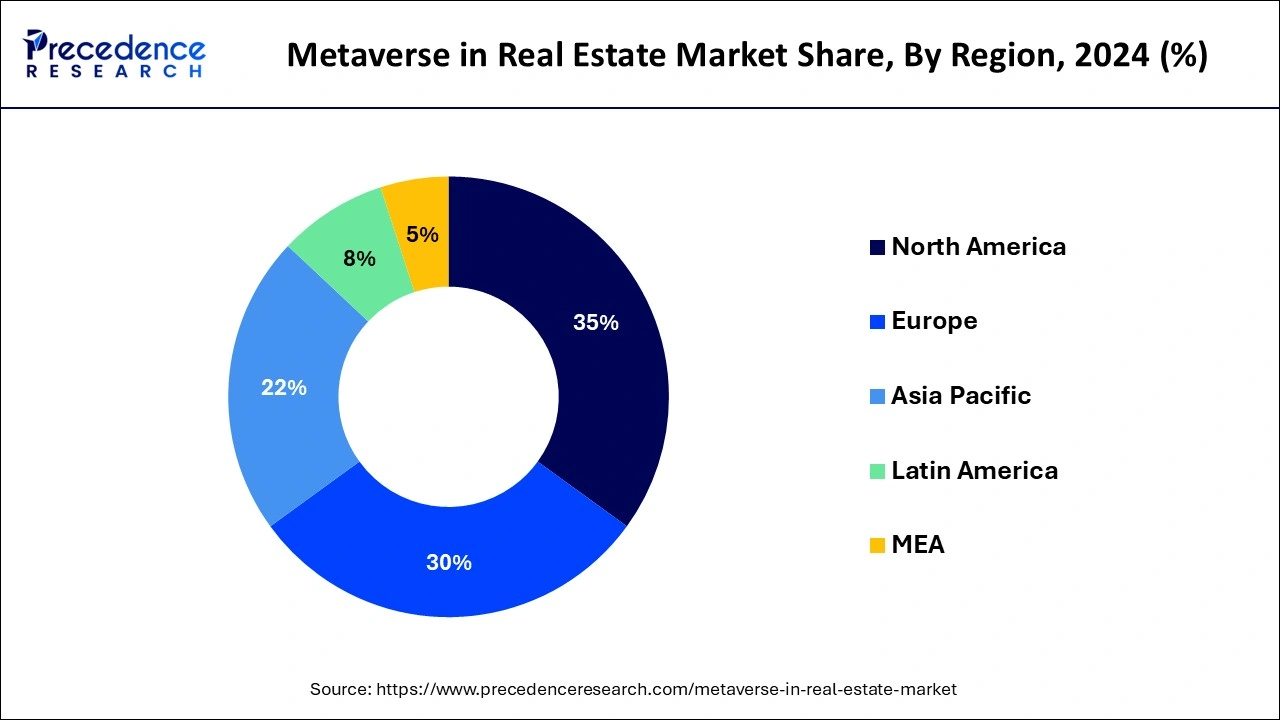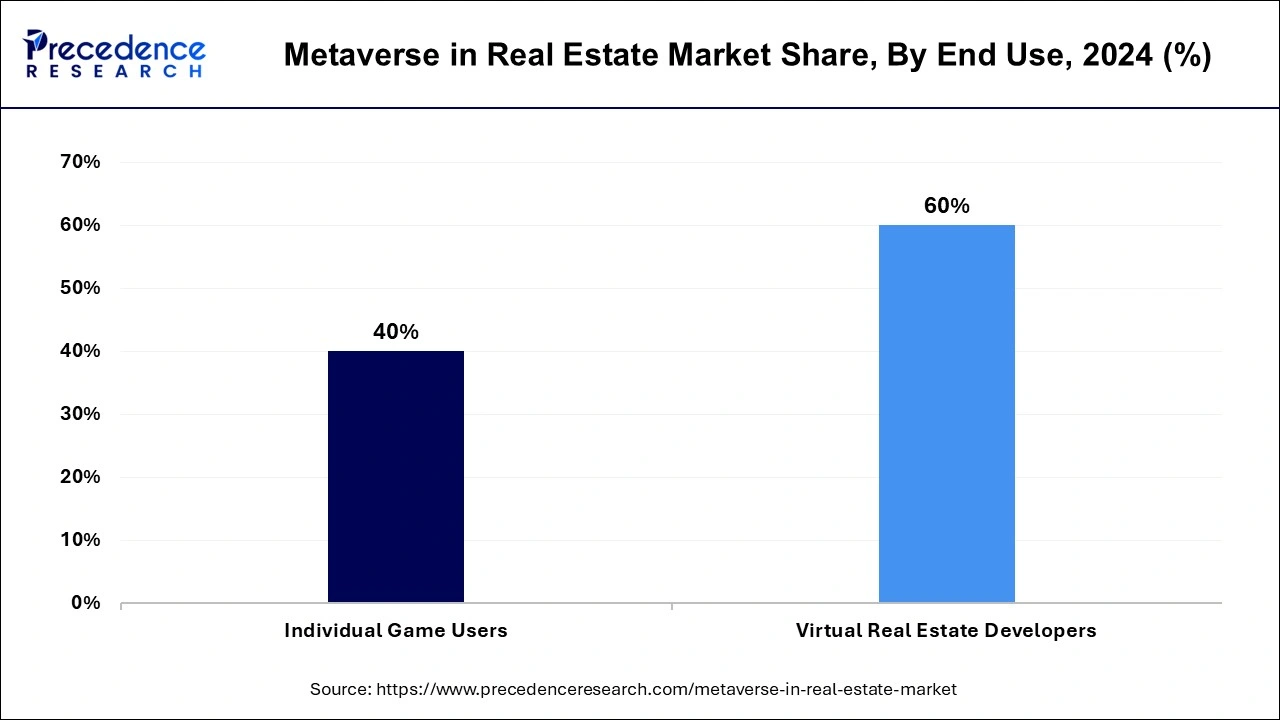Metaverse in Real Estate Market Size and Forecast 2025 to 2034
The global metaverse in real estate market size was calculated at USD 2.99 billion in 2024 and is predicted to increase from USD 4.12 billion in 2025 to approximately USD 67.40 billion by 2034, expanding at a CAGR of 36.55% from 2025 to 2034.

Metaverse in Real Estate MarketKey Takeaways
- The global metaverse in real estate market was valued at USD 2.99 billion in 2024.
- It is projected to reach USD 67.40 billion by 2034.
- The metaverse in real estate market is expected to grow at a CAGR of 36.55% from 2025 to 2034.
- North America contributed 35% of market share in 2024.
- Asia-Pacific is estimated to expand the fastest CAGR between 2025 and 2034.
- By type, the buy metaverse real estate segment has held the largest market share of 47% in 2024.
- By type, the sell metaverse real estate segment is anticipated to grow at a remarkable CAGR of 40% between 2025 and 2034.
- By end use, the virtual real estate developers segment generated over 60% of the market share in 2024.
- By end use, the individual game users segment is expected to expand at the fastest CAGR over the projected period.
U.S. Metaverse in Real Estate Market Size and Growth 2025 to 2034
The U.S. metaverse in real estate market size was exhibited at USD 0.73 billion in 2024 and is projected to be worth around USD 16.64 billion by 2034, growing at a CAGR of 36.70% from 2025 to 2034.

In 2024, North America held a share of 35% in the metaverse in the real estate market due to its advanced technological infrastructure, high internet penetration, and a tech-savvy population. The region's robust real estate industry is quick to adopt innovative solutions, and major tech hubs, such as silicon Valley, drive continuous development in the metaverse. Additionally, a strong investor ecosystem and a culture of early tech adoption contribute to North America's leadership, making it a prominent player in shaping the future of real estate within the evolving metaverse landscape.

Asia-Pacific is poised for rapid growth in the metaverse real estate market due to increasing digital adoption, tech-savvy populations, and robust economic development. The region's expanding middle class, coupled with a surge in online platforms, drives demand for immersive and virtual property experiences. Governments in the region are also supporting digital transformation, further propelling the metaverse's integration into the real estate sector. These factors collectively position Asia-Pacific as a key hub for metaverse expansion in real estate, fostering innovative and dynamic approaches to property exploration and transactions.
Meanwhile, Europe is experiencing significant growth in the metaverse real estate market due to increasing tech adoption and a robust real estate sector. The region's forward-thinking approach to technology, coupled with a strong emphasis on innovation in the real estate industry, has led to widespread acceptance of metaverse applications. Virtual property exploration, global accessibility, and immersive planning tools have fueled the demand. Additionally, a tech-savvy population and favorable regulatory environments contribute to the metaverse's flourishing presence, making Europe a key player in the evolving landscape of virtual real estate experiences.
Market Overview
The metaverse in real estate refers to a digital, immersive space where people can interact and engage in property-related activities. In this virtual environment, users can explore properties, attend virtual open houses, and even visualize potential home renovations. Real estate companies are increasingly utilizing the metaverse to create a more dynamic and interactive experience for buyers, allowing them to tour properties from the comfort of their homes. This technology has the potential to revolutionize the way real estate transactions are conducted, making it more accessible and convenient for individuals to explore and invest in properties without physically being present at the location.
Metaverse in Real Estate Market Data and Statistics
- According to a survey by Realtor.com, properties with virtual tours receive 87% more views than those without.
- A study by the National Association of Realtors (NAR) found that international buyers accounted for 4% of existing-home sales in the U.S., amounting to $153 billion in 2021.
- A case study by a leading real estate developer indicated a 30% reduction in project planning time and a 15% decrease in costs through metaverse-based planning.
Metaverse in Real Estate Market Growth Factors
- The metaverse enables immersive digital property showcases, allowing potential buyers to explore homes virtually. This feature enhances property visibility and accessibility, contributing to a potential increase in property inquiries and sales.
- The metaverse eliminates geographical constraints, providing a platform for real estate transactions on a global scale. This expanded reach opens up new markets for real estate developers and agents, fostering international investment opportunities.
- Real estate professionals leverage the metaverse for collaborative planning and design, streamlining the decision-making process. Virtual reality (VR) tools enable stakeholders to visualize and modify property designs, leading to more informed and efficient development decisions.
- The metaverse often incorporates blockchain technology for secure and transparent property transactions. Blockchain ensures trust and authenticity, reducing the likelihood of fraud and promoting a more secure and efficient transaction environment.
- Metaverse platforms host virtual real estate events and networking opportunities, bringing together industry professionals and potential buyers. These events provide a dynamic space for knowledge-sharing, networking, and property auctions, fostering a vibrant and engaged real estate community.
- Smart contracts within the metaverse automate various aspects of real estate transactions, from property listings to contract execution. This automation reduces the need for intermediaries, streamlining processes and potentially lowering transaction costs.
Market Scope
| Report Coverage | Details |
| Growth Rate from 2025 to 2034 | CAGR of 36.55% |
| Market Size in 2025 | USD 4.12 Billion |
| Market Size by 2034 | USD 67.40 Billion |
| Base Year | 2024 |
| Forecast Period | 2025 to 2034 |
| Segments Covered | Type and End Use |
| Regions Covered | North America, Europe, Asia-Pacific, Latin America, and Middle East & Africa |
Market Dynamics
Driver
Blockchain-backed transactions
- Blockchain adoption in real estate has shown a 40% increase in transaction efficiency, as per early adopters' experiences.
Blockchain-backed transactions significantly boost the demand for the metaverse in the real estate market by introducing transparency, security, and efficiency. Blockchain, a decentralized and tamper-proof ledger, ensures trust in property transactions. Its adoption in the metaverse not only minimizes the risk of fraud but also accelerates the overall process, reducing the need for intermediaries. In the real estate market, where trust and transparency are paramount, blockchain provides a reliable foundation for property deals.
The streamlined and secure nature of blockchain-backed transactions attracts more participants to the metaverse, as buyers and sellers seek a seamless and trustworthy platform. As a result, the increased confidence in the reliability of transactions contributes to a surge in market demand for the metaverse in real estate, creating a more robust and efficient ecosystem for property transactions.
Restraint
Limited physical interaction
Limited physical interaction poses a significant restraint on the market demand for the metaverse in the real estate industry. Traditional property transactions involve in-person visits, allowing buyers to physically explore and assess a potential investment. The absence of this tactile experience in the metaverse creates a hurdle, as some individuals may be hesitant to make substantial real estate decisions without physically inspecting the property. Buyers often rely on sensory experiences like touching and feeling the space, which virtual interactions cannot fully replicate.
The metaverse's limitation in offering a hands-on approach could result in a slower adoption rate, particularly among those who place high value on the tangible aspects of property assessment. Addressing this challenge may involve incorporating innovative solutions within the metaverse, such as advanced virtual reality features, to enhance the immersive experience and bridge the gap between digital exploration and the tactile elements crucial in real estate decision-making.
Opportunity
Virtual events and auctions
- Virtual real estate events and auctions in the metaverse attract 50% more participants compared to traditional events, leading to a 15% boost in overall sales prices, based on an analysis of virtual auctions.
Virtual events and auctions are creating lucrative opportunities in the real estate market for the metaverse by revolutionizing how properties are showcased and transactions are conducted. These digital platforms offer a dynamic and inclusive space where buyers, sellers, and industry professionals can converge, transcending geographical limitations. Virtual events provide an interactive environment for property exhibitions, enabling a broader audience to explore real estate offerings without physical constraints. Auctions within the metaverse have proven to be particularly impactful, attracting increased participation compared to traditional in-person events.
The competitive and transparent nature of virtual auctions enhances the market value of properties, leading to potentially higher sales prices. This innovative approach not only expands the market reach but also fosters a more engaging and efficient avenue for real estate transactions, showcasing the metaverse's potential to redefine the dynamics of property sales and acquisitions in a globally accessible and digitally immersive manner.
Type Insights
The buy metaverse real estate segment held the highest market share of 47% in 2024. The buy metaverse real estate segment refers to the acquisition of virtual properties within the metaverse, offering users ownership of digital assets such as virtual land, buildings, or spaces. This emerging trend reflects a shift toward digital property ownership and investment, driven by the growing popularity of virtual worlds. As the metaverse gains traction, individuals and businesses are increasingly participating in this novel real estate market, leveraging blockchain technology for secure transactions and exploring diverse opportunities for virtual property development and monetization.
The sell metaverse real estate segment is anticipated to witness rapid growth at a significant CAGR of 39.16% during the projected period. In the metaverse real estate market, the "sell" segment refers to platforms and transactions where virtual properties are listed and sold. This segment encompasses digital spaces, land, and assets within virtual environments. A notable trend in the sell metaverse real estate segment involves the adoption of blockchain for secure transactions and the rise of virtual auctions, providing a transparent and competitive platform for buyers. As virtual property ownership gains traction, the sell segment continues to evolve, offering new avenues for property transactions within the dynamic and expanding metaverse ecosystem.
End Use Insights
According to the end use, the virtual real estate developers segment has held 60% market share in 2024. In the metaverse real estate market, the virtual real estate developers segment comprises professionals and entities specializing in creating and enhancing virtual properties. These developers design and build immersive digital landscapes for various purposes, including residential, commercial, and entertainment ventures within the metaverse. Trends indicate a growing demand for visually appealing and interactive virtual spaces, reflecting the metaverse's potential for diverse applications. Virtual real estate developers play a pivotal role in shaping the metaverse's landscape, catering to the evolving needs of users seeking engaging and innovative digital environments.

The individual game users segment is anticipated to grow rapidly over the projected period. In the context of the metaverse in real estate, the individual game users segment refers to private users engaging with virtual environments for property exploration. This segment is witnessing a growing trend as more individuals opt for immersive experiences to virtually tour and assess real estate. With advanced technologies like augmented reality and virtual reality, individual users can explore properties in detail, fostering a trend towards personalized, interactive property interactions within the metaverse, enhancing the overall user experience in the real estate market.
Metaverse in Real Estate Market Companies
- Facebook (Meta)
- Decentraland
- Cryptovoxels
- Somnium Space
- The Sandbox
- High Fidelity
- VRChat
- Microsoft
- Nvidia
- Unity Technologies
- Blockchain.com
- AltspaceVR
- Spatial.io
- JanusVR
Recent Developments
- In October 2021, Tokens.com disclosed its acquisition of a 50% stake in Metaverse Group, a major player in the metaverse land sector. This strategic move involved the purchase of significant virtual real estate, valued at 618,000 MANA, the currency of Decentraland.
- In March 2022, TerraZero Technologies Inc. successfully finalized the acquisition of virtual real estate from Carl Fravel. The transaction, appraised at a substantial USD 2,775,000, marked a significant investment in the virtual property space, showcasing TerraZero's commitment to the evolving landscape of digital real estate assets.
Segments Covered in the Report
By Type
- Buy Metaverse Real Estate
- Sell Metaverse Real Estate
- Rent Metaverse Real Estate
By End Use
- Individual Game Users
- Virtual Real Estate Developers
By Geography
- North America
- Europe
- Asia-Pacific
- Latin America
- Middle East and Africa
For inquiries regarding discounts, bulk purchases, or customization requests, please contact us at sales@precedenceresearch.com
Frequently Asked Questions
Ask For Sample
No cookie-cutter, only authentic analysis – take the 1st step to become a Precedence Research client
 Get a Sample
Get a Sample
 Table Of Content
Table Of Content
 sales@precedenceresearch.com
sales@precedenceresearch.com
 +1 804-441-9344
+1 804-441-9344
 Schedule a Meeting
Schedule a Meeting